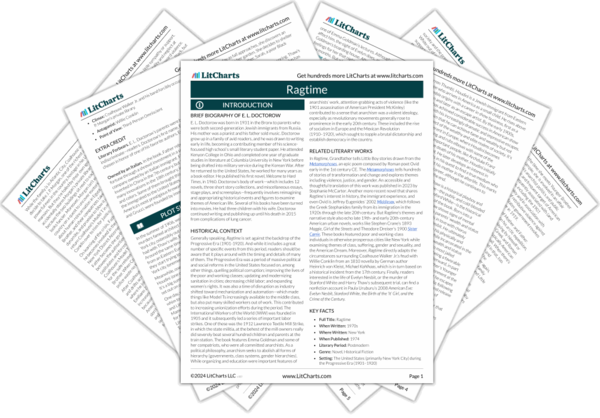Grandfather Quotes in Ragtime
[Little Boy] felt that the circumstances of his family’s life operated against his need to see things and go places. For instance he had conceived an enormous interest in the works and career of Harry Houdini, the escape artist. But he had not been taken to a performance. Houdini was a headliner in the top vaudeville circuits. His audiences were poor people—carriers, peddlers, policemen, children. His life was absurd. He went all over the world accepting all kinds of bondage and escaping. He was roped to a chair. He escaped. He was chained to a ladder. He escaped. He was handcuffed, his legs were put in irons, he was tied up in a strait jacket and put in a locked cabinet. He escaped. He escaped form bank vaults, nailed-up barrels, sewn mailbags; he escaped from a zinc-lined Knabe piano case, a giant football, […] a rolltop desk, a sausage skin.

Unlock explanations and citation info for this and every other Ragtime quote.
Plus so much more...
Get LitCharts A+But he would sit in the parlor and tell the boy stories from Ovid. They were stories of people who became animals or trees or statues. They were stories of transformation. Women turned into sunflowers, spiders, bats, birds; men turned into snakes, pigs, stones and even thin air. The boy did not know he was hearing Ovid, and it would not have mattered if he had known. Grandfather’s stories proposed to him that the forms of life were volatile and that everything in the world could as easily be something else. The old man’s narrative would often drift from English to Latin without his being aware of it, as if he were reading to one of his classes of forty years before, so that it appeared nothing was immune to the principle of volatility, not even language.

Grandfather Quotes in Ragtime
[Little Boy] felt that the circumstances of his family’s life operated against his need to see things and go places. For instance he had conceived an enormous interest in the works and career of Harry Houdini, the escape artist. But he had not been taken to a performance. Houdini was a headliner in the top vaudeville circuits. His audiences were poor people—carriers, peddlers, policemen, children. His life was absurd. He went all over the world accepting all kinds of bondage and escaping. He was roped to a chair. He escaped. He was chained to a ladder. He escaped. He was handcuffed, his legs were put in irons, he was tied up in a strait jacket and put in a locked cabinet. He escaped. He escaped form bank vaults, nailed-up barrels, sewn mailbags; he escaped from a zinc-lined Knabe piano case, a giant football, […] a rolltop desk, a sausage skin.

Unlock explanations and citation info for this and every other Ragtime quote.
Plus so much more...
Get LitCharts A+But he would sit in the parlor and tell the boy stories from Ovid. They were stories of people who became animals or trees or statues. They were stories of transformation. Women turned into sunflowers, spiders, bats, birds; men turned into snakes, pigs, stones and even thin air. The boy did not know he was hearing Ovid, and it would not have mattered if he had known. Grandfather’s stories proposed to him that the forms of life were volatile and that everything in the world could as easily be something else. The old man’s narrative would often drift from English to Latin without his being aware of it, as if he were reading to one of his classes of forty years before, so that it appeared nothing was immune to the principle of volatility, not even language.











